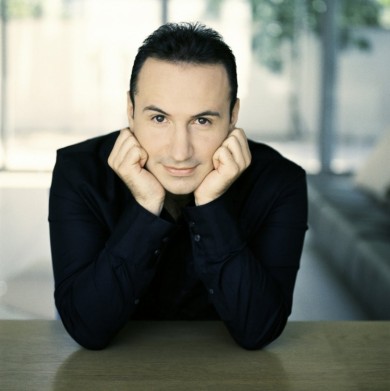Trpčeski brings thrilling bravura and intellectual depth to Liszt and Schubert

Simon Trpčeski performed a recital devoted to Liszt and Schubert Saturday night at Gusman Concert Hall.
Two days before his Carnegie Hall debut, the remarkable Macedonian pianist Simon Trpčeski previewed that program at the University of Miami’s Gusman Hall, an event presented by Sunday Afternoons of Music.
His choice of works Saturday night consisted entirely of Liszt and Schubert, two composers as far apart as you could get in musical sensibilities: one the dashing Mephistopheles of the piano whose recitals inspired women throughout Europe to faint, the other the honest musical artist who poured forth a stream of masterpieces from his modest rooms in Vienna.
At a time when a new virtuoso of the decade seems to emerge every season, Trpčeski is a genuinely unusual talent. His tone at the keyboard is uniquely his own, assured and articulate, yet with a velvety touch that takes on the most difficult, rapid flights of virtuosity without a trace of brittleness. His technique was top-notch, effortless yet without the feeling of detachment that comes from some performers who have mastered their instrument.
In devoting the entire first half to Liszt, rather than just programming a couple of the composer’s works as bon-bons at the end, Trpčeski seemed to be making a statement on the seriousness of Liszt’s musical output, a subject of debate thanks largely to the composer’s own habit of publishing virtually every musical idea that occurred to him.
Trpčeski is a pianist of enormous concentration. He emerged on stage, bowed and waited at the piano for absolute silence—which in South Florida concert halls can be a long wait—before beginning. He opened with Liszt’s reworking of Bach’s Prelude and Fugue in A Minor, originally composed for organ. Trpčeski gave a grand, sweeping and majestic account, teasing the melody out from among the thundering bass octaves without pedantic over-emphasizing.
He continued with Liszt’s Petrarch Sonnet No. 104 from Années de pèlerinage, a meditative, ruminating work with bursts of virtuosity at the treble end of the keyboard that seemed to almost explode from the pianist’s hand. Les jeux d’eaux à la Villa d’Este, a portrait of light rays on sprinkling water, came off with the effortless, liquid, Debussy-like textures.
Like Rossini’s William Tell Overture and the first bars of Beethoven’s Fifth Symphony, Liszt’s Hungarian Rhapsody No. 2 is one of those works of classical music that’s familiar to almost everyone. What was most remarkable about Trpčeski’s performance—aside from the virtually note-perfect technique and hair-raising speed—was how quiet and under control he kept it, never lapsing into the faintly panicky fortissimos of lesser pianists’ performances.
After intermission, Trpčeski performed a set of 16 short German Dances by Schubert, melodies that ranged from wistful to jaunty, performed with a wide range of colors.
The program concluded with Schubert’s Wanderer Fantasy, a work as long as a sonata, which places demands on the performer that put it out of range of Schubert’s own limited technique. Trpčeski played the opening movement in an exciting, dramatic way, bringing out Schubert’s stark harmonies with a transparent tone that never sounded hollow, giving a songlike accounts of the melodies, and bringing off the movement with great drive and momentum.
The Adagio, a set of variations on Schubert’s song Der Wanderer, benefited greatly from his rich keyboard tone. He drew maximum energy from the bursts of drama, such as the rapid-fire chords that alternate between left and right hands in the middle of the movement. Even the most difficult passages—such as the rapid, tinkling variation that starts high in the right hand—were shaped and in service of a musical idea.
The Presto was taken unusually fast, maybe faster than called for, but Trpčeski never lost control, and this is after all Schubert’s most virtuosic piano work. The movement ends with epic sweeps up and down the keyboard, and Trpčeski gave a memorably grandiose account of them. He built the final movement, with its complex, difficult counterpoint, into a magnificent, climactic burst of sound that made a completely satisfying ending to this great work.
As an encore, Trpčeski offered a glowing, soft-hued performance of Schubert’s Serenade.
Posted in Performances
Leave a Comment
Sun Feb 26, 2012
at 1:15 pm
No Comments




